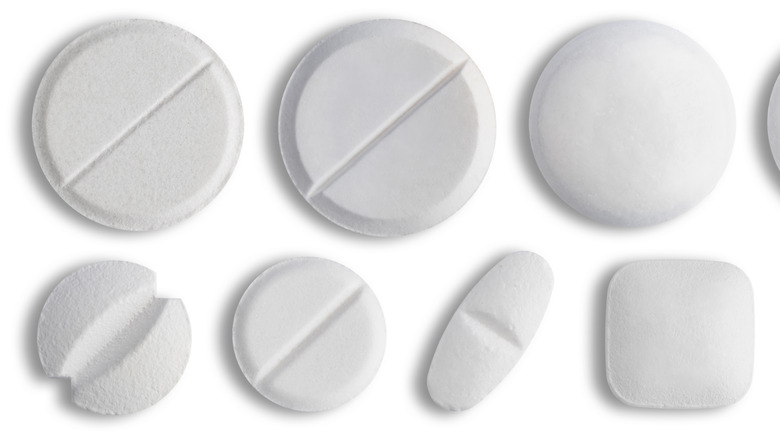Beta Blockers Explained: Usage, Dosage, And Side Effects
Beta blockers, or beta-adrenergic blocking agents, are pharmaceutical drugs that interact with the cardiovascular system. As the Mayo Clinic explains, beta blockers cause your heart to beat more slowly and with less force, and they improve your blood flow by widening your blood vessels. In other words, they lower stress on your heart, veins, and arteries. As such, they can be very beneficial in the treatment of a variety of cardiovascular issues, but they need to be used with caution. Beta blockers are only available via prescription, meaning you can't purchase them without having them prescribed by a doctor. They are typically prescribed to treat hypertension or high blood pressure, but they have many other uses as well.
According to a study published in Cardiology, the first beta blockers were synthesized in 1958, about a decade after the discovery of beta-adrenergic receptors. Beta blockers work by blocking beta-adrenergic receptors, slowing down certain functions of the cardiovascular system. They were first prescribed to treat angina (severe chest pain), but they have since been clinically studied and used to treat a wide variety of heart conditions. In smaller doses, they are also used to treat certain types of anxiety.
Beta blockers block epinephrine (adrenaline) and norepinephrine
A 2012 study in Cardiology explains that beta blockers inhibit the effects of the stress hormones epinephrine (also known as adrenaline) and norepinephrine. They do this by blocking beta-adrenergic receptors, which are responsible for regulating these stress hormones. Epinephrine and norepinephrine are released when the sympathetic nervous system is activated, preparing us for fight-or-flight. This is our body's stress response, and when it gets triggered, our heart rate increases, our blood pressure rises, and digestion and relaxation are put on hold (via a study from Frontiers in Neuroendocrinology). These are all beneficial adaptations when confronting a predator, but of course, most modern stressors don't actually require us to fight or flee. When our stress response isn't appropriate to a given situation, it's said to be maladaptive.
Unfortunately, this describes the vast majority of modern stressors. It's very rare that increases in heart rate and blood pressure actually help us perform the specific tasks that are causing us stress. This is where beta blockers can help. They essentially block the function of the sympathetic nervous system, inhibiting the fight-or-flight response. Though they're typically prescribed for heart problems, they're also prescribed for a variety of anxiety disorders in lower doses, since they can help combat stress.
Beta blockers reduce heart rate
The UK National Health Service (NHS) says that the main function of beta blockers is to slow down the heart rate. Beta blockers do so by blocking the effects of stress hormones (which increase your heart rate), such as adrenaline. Because of the direct effect they have on the cardiovascular system, beta blockers are most often used to treat conditions of the heart.
The NHS goes on to explain that beta blockers may not be safe for those with a slow heart rate. This makes sense, given that beta blockers reduce heart rate: If your heart rate is already low, artificially lowering it even more could make things worse. Beta blockers can also interact with other drugs that affect heart rate, such as drugs taken for an irregular heart beat.
Additionally, because they lower your heart rate, beta blockers can interfere with cardiovascular exercise. As the Mayo Clinic explains, if you exercise while experiencing the effects of beta blockers, you may not be able to reach your target heart rate. This doesn't necessarily mean your exercise won't be effective, but you may not get all the same benefits you would get from exercising without beta blockers. If you take beta blockers regularly and also exercise regularly, it's a good idea not to take your beta blockers just before exercising.
Beta blockers are used to lower blood pressure
Beta blockers are used to reduce blood pressure, as the Mayo Clinic explains. Since they lower blood pressure, they are a good option to treat high blood pressure. However, beta blockers tend to be prescribed to treat hypertension only when other medications have failed. In general, they're not recommended as a primary treatment for patients who only have high blood pressure (and no other heart conditions). Sometimes, doctors will prescribe beta blockers in tandem with other medications as part of a broader hypertension treatment.
A systematic review from the Cochrane Database of Systematic Reviews notes that many of the randomized controlled trials that have been conducted on the use of beta blockers as a first treatment for hypertension have a high risk of bias. That said, the researchers conclude that other prescription drugs for hypertension are more effective, but they also point out that further research needs to be done. In the meantime, beta blockers may be prescribed to treat hypertension alongside other pharmaceutical drugs, or when other treatments have failed.
Beta blockers can treat various heart conditions
Beta blockers directly affect the cardiovascular system, and as such, they are frequently prescribed for a variety of heart conditions. According to the Mayo Clinic, beta blockers may be used to treat heart attacks, arrhythmia (irregular heart rate), heart failure, and angina (severe chest pain), among other conditions.
A review from the Journal of the American College of Cardiology found the use of beta blockers could lead to fewer deaths in patients with a specific type of heart failure characterized by "reduced ejection fraction in sinus rhythm." Reduced ejection fraction means the heart is not pumping enough blood out to the veins, and sinus rhythm refers to an otherwise normal heart rhythm. The researchers note that heart rate reduction via the use of beta blockers was only beneficial in patients in sinus rhythm. Additionally, a meta-analysis from the Journal of the American College of Cardiology suggests beta blockers are less effective in patients with heart failure who also have atrial fibrillation, or arrhythmia, while patients in sinus rhythm who had heart failure experienced greater benefit from beta blockers. This suggests beta blockers are less effective for those with atrial fibrillation or arrhythmia, but they can be beneficial for other forms of heart failure.
Beta blockers can help manage anxiety
Beta blockers block the function of stress hormones like adrenaline, per a study published in Cardiology. For this reason, they've long been used to treat maladaptive stress and anxiety. A review from L'encéphale suggests propranolol, a popular beta blocker, can be effective in the treatment of a variety of anxiety disorders. The researchers specifically mention anxiety disorders characterized by physical symptoms (e.g. increased heart rate or tremors) as well as moderately intense or recently developed anxiety disorders as the types of disorders that benefit most from propranolol. They also note that the average dose of propranolol for these disorders is between 20 and 40 milligrams, which is lower than the average dose that's used to treat heart failure. (The NHS claims that 80 milligrams of propranolol is an appropriate starting dose to treat hypertension.)
The study from L'encéphale also says further research is needed on long-term use of beta blockers for the treatment of anxiety. It remains unclear how safe it is to take beta blockers regularly for more than 4 weeks in order to treat anxiety disorders. Additionally, WebMD suggests you shouldn't take beta blockers if you have low blood pressure (hypotension) since they reduce blood pressure, so patients with anxiety disorders who also have low blood pressure may want to avoid them — or stick to very low doses.
Beta blockers can prevent performance anxiety
Beta blockers are also used to treat the symptoms associated with performance anxiety. They work by blocking the fight-or-flight response (via a study published in Cardiology), which is unnecessarily triggered during performance anxiety. According to a review from L'encéphale, propranolol (a commonly prescribed beta blocker) can help to prevent performance anxiety, which includes nervousness around public speaking as well as social phobias. Propranolol is especially beneficial for anxiety disorders accompanied by physical symptoms, which include performance anxiety. It can help to prevent the increase in heart rate and muscle tremors associated with performance anxiety and nervousness.
A systematic review and meta-analysis from the Journal of Psychopharmacology notes that there is insufficient evidence that propranolol can be effective in the long-term treatment of certain anxiety disorders (other than panic disorder), but the researchers discuss some of the specific mechanisms through which propranolol can lower anxiety in the short-term. They note that propranolol may break a "vicious cycle" of panic, wherein the initial physical symptoms of the stress response (e.g. increased heart rate and breathing rate) can cause further panic or anxiety. This is particularly notable in the case of performance anxiety, wherein the fight-or-flight response can significantly hinder performance and cause secondary stress. When taken in advance, beta blockers can prevent the "fight or flight" response altogether.
Beta blockers may prevent migraines
According to the Mayo Clinic, beta blockers can also be used to treat or prevent migraines. Healthline explains some of the potential mechanisms through which beta blockers can help in the treatment of migraines. For instance, by inhibiting the stress response, reducing electrical activity in the nervous system, restricting excess blood flow in the brain, and maintaining serotonin levels in the brain, beta blockers may help to create conditions in which migraines are much less likely.
A systematic review and meta-analysis from PLOS One found propranolol to be significantly more effective than a placebo in treating and preventing episodic migraines. Those with episodic migraines experienced an average of 1.3 fewer headaches each month when taking propranolol as compared to a placebo. Propranolol may also be of benefit in treating other types of migraines and headaches, though further research is needed. The researchers only identified one study on the use of beta blockers for the treatment of tension-type headaches. That said, it's plausible that beta blockers could be effective in preventing and treating tension-type headaches, given that they inhibit the physical symptoms of the "fight or flight" response (via a study published in Cardiology), one of which is muscular tension.
Dosage of beta blockers depends on the reason they were prescribed
The right dose of beta blockers depends on the reason for taking them. For instance, higher doses of propranolol are used to treat high blood pressure, whereas lower doses are used to treat anxiety, according to the NHS. The NHS suggests that the starting dose of propranolol for high blood pressure is 80 milligrams twice a day, but they also note that an individual dose may be increased up to 160 milligrams. Meanwhile, when used to prevent migraines or treat angina (severe chest pain), 40 milligrams of propranolol 2-3 times per day might be prescribed, but the dose could also be doubled when necessary. For anxiety, they don't recommend more than 40 milligrams per dose, 3 times per day.
That said, some evidence suggests even lower doses may be beneficial. A study from Northwestern Medicine found lower doses of beta blockers (about one quarter of the recommended dose) used to help patients recover from heart attacks were just as effective, if not more so, than the regular doses. This came as a huge surprise to the lead researcher, Dr. Jeffrey Goldberger, who expected to find higher mortality rates in patients who were given lower doses. In reality, though, the low dose group actually did better than the regular dose group. Further research is needed, but this suggests beta blockers may be beneficial even in very low doses.
Dosage of beta blockers also depends on which beta blocker was prescribed
An article from Harvard Health sorts beta blockers into three categories, depending on which types of beta-adrenergic receptors they block. Nonselective beta blockers (including propranolol) are the original form of the drug, blocking all types of beta-adrenergic receptors. The authors note that people who smoke or who have asthma or other lung conditions should use this type of beta blocker with caution, if at all. Meanwhile, cardioselective beta blockers (including atenolol and metoprolol) only block beta-1 adrenergic receptors, making them safer for people with lung conditions (since beta-2 adrenergic receptors affect the lungs). Lastly, third-generation beta blockers (including labetalol) block alpha-adrenergic receptors in addition to beta-adrenergic receptors, relaxing blood vessels even more so than other types of beta blockers.
The dosage of the medication also depends on the form of the drug. Some beta blockers are extended-release pills meant to be taken once a day, while some are meant to be taken multiple times a day. These drugs should always be taken as prescribed. If, for instance, your doctor prescribed you a once-a-day pill, it may not be safe to take it more than once a day. In general, the best practice is to start with as low a dose as possible, and if that doesn't work, slowly increase your dose with guidance from your doctor.
Side effect: tiredness and dizziness
In general, most of the people who take beta blockers will experience no (or very mild) side effects, according to the American Academy of Family Physicians (AAFP). However, some side effects have been reported. Healthline says one of the most common side effects is tiredness or dizziness. Healthline notes these are also symptoms of hypotension and likely caused by the blood pressure reducing effect of beta blockers.
Driving a car or operating any sort of machinery could be dangerous when taking beta blockers, as you're not sure whether or not they'll make you feel dizzy. Driving is obviously not recommended when you're feeling dizzy or lightheaded, since this puts you at an increased risk of accidents. When taking beta blockers for the first time, you may be fine to drive or do anything else you'd normally do, but it's a good idea to avoid these things or at least wait until you have a better sense of how the medication affects you.
The AAFP also mentions that the dizziness and lightheadedness side effects usually improve after a couple of days of taking the medication. However, if you're taking beta blockers on an as-needed basis for anxiety, it may take you longer to adjust to them and figure out the right dose. In general, taking lower doses of the medication will give you a lower risk of side effects (via Harvard Health).
Side effect: poor circulation
As beta blockers lower your heart rate and blood pressure (via the Mayo Clinic), some of their side effects mimic those of abnormally low heart rate or blood pressure. An article from Healthline explains beta blockers can cause poor circulation because of their effects on the cardiovascular system. Poor circulation can, in turn, cause a number of secondary side effects and complications. For instance, the Cleveland Clinic suggests poor circulation can cause weakness, numbness, tingling sensations, cold hands or feet, and chest pain, among other things. If it goes untreated, it's a potentially life-threatening condition.
As with other side effects, taking a lower dose of the drug reduces the potential risk and severity of poor circulation. Harvard Health asserts that lower doses equate to a lower risk of side effects. When taking beta blockers for any reason, it's a good idea to start with as low a dose as possible, and slowly work your way to higher doses only if your current dose has no effect (with supervision from your doctor).
Side effect: stomach problems
An article from Healthline identifies digestive issues (e.g. stomach ache, nausea, constipation, or diarrhea) to be one of the side effects of beta blockers. Harvard Health also suggests beta blockers can cause stomach pain. Good circulation is important for good digestion; in particular, increased blood flow is necessary after a meal to help you digest (via a review from Tidsskr Nor Laegeforen). Healthline explains beta blockers slow heart rate and lower blood pressure, so it's possible this could have a negative effect on our digestion.
Additionally, a review from Cureus found beta blockers could cause hepatotoxicity, or acute liver damage, but this is very rare. The researchers note that only 0.3% of patients on carvedilol (a beta blocker) developed liver problems, and many of these cases were patients with comorbidities taking other drugs. The NHS lists antipsychotics, mefloquine, clonidine, antihypertensives, and antiarrhythmics as drugs that can interfere with beta blockers. If you are already taking any of these drugs, you may want to avoid beta blockers (or stick to very low doses).
Side effect: insomnia or nightmares
The NHS mentions trouble sleeping and nightmares are potential side effects of beta blockers. Similarly, Harvard Health identifies insomnia and "disturbing dreams" to be potential side effects of these drugs. However, this may depend on the sort of beta blocker you're taking. Healthline explains that insomnia and nightmares are more commonly experienced with nonselective beta blockers, such as propranolol. If you'd like to avoid this potential side effect, you might consider taking a cardioselective beta blocker, which is less likely to cause insomnia or nightmares.
Another way to reduce your risk of side effects is to take low doses of the drug. Harvard Health claims that lower doses of these drugs carry a lower risk of side effects. Relatedly, a study from the Canadian Medical Association Journal points out dose-response studies often aren't conducted and argues that the clinical recommendations for beginner doses of prescription medications are almost always too high. The researchers recommend starting with half or even a quarter of the lowest possible prescribed dose for most drugs, which they argue may provide sufficient benefits with a very low risk of adverse side effects.
Side effect: beta blockers may lead to depression – but this is very unlikely
According to Healthline, one of the less common side effects of taking beta blockers is depression. Healthline suggests depression is more likely with certain types of beta blockers, specifically nonselective beta blockers (e.g. propranolol). Other types of beta blockers like cardioselective beta blockers may make this side effect even less likely.
That said, a 2021 systematic review and meta-analysis from the journal Hypertension found depression to be no more likely in patients taking beta blockers than in those receiving placebos. While the researchers didn't study the different types of beta blockers separately, many of the studies they analyzed used propranolol, a nonselective beta blocker. This suggests depression may not be a side effect of beta blockers at all — but if it is, it's very rare.
To minimize the risk of any side effect when taking beta blockers, work with your doctor to find the lowest possible dose that will be effective for you. As Harvard Health asserts, you have a much lower risk of adverse side effects when you take a low dose.















